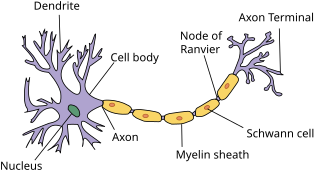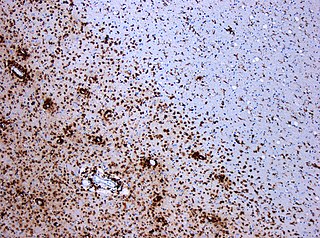
In vertebrates, most neuronal cell axons are encased in myelin. Simply put, myelin insulates axons and increases the rate at which electrical impulses are passed along the axon. The myelinated axon can be likened to an electrical wire with insulating material (myelin) around it. However, unlike the plastic covering on an electrical wire, myelin does not form a single long sheath over the entire length of the axon. Rather, myelin ensheaths the axon in segments: in general, each axon is encased in multiple long myelin sheaths separated by short gaps called nodes of Ranvier.
Genentech, Inc. is an American biotechnology corporation headquartered in South San Francisco, California. It became an independent subsidiary of Roche in 2009. Genentech Research and Early Development operates as an independent center within Roche. Historically, the company is regarded as the world's first biotechnology company.

Biogen Inc. is an American multinational biotechnology company based in Cambridge, Massachusetts, specializing in the discovery, development, and delivery of therapies for the treatment of neurological diseases to patients worldwide.

A demyelinating disease refers to any disease affecting the nervous system where the myelin sheath surrounding neurons is damaged. This damage disrupts the transmission of signals through the affected nerves, resulting in a decrease in their conduction ability. Consequently, this reduction in conduction can lead to deficiencies in sensation, movement, cognition, or other functions depending on the nerves affected.
The National Multiple Sclerosis Society (NMSS) is a nonprofit organization founded in 1946.
The Multiple Myeloma Research Foundation (MMRF) is a charitable organization dedicated to multiple myeloma, an incurable blood cancer. The MMRF runs as if it were a for-profit business, expecting high returns from the money the organization raises from donors.

Kathy Giusti is a business leader and a healthcare disrupter. She is a two-time cancer survivor having been diagnosed with multiple myeloma and breast cancer. Kathy Co-Founded the Multiple Myeloma Research Foundation where she served as CEO and president for nearly two decades. She also co-chaired the Harvard Business School (HBS) Kraft Precision Medicine Accelerator, which she helped found, as a Senior Fellow at Harvard Business School.

The Children's Tumor Foundation (CTF) is a 501(c)(3) foundation dedicated to improving the health and well-being of individuals and families affected by NF, a group of genetic conditions known as neurofibromatosis or schwannomatosis. Their four-part mission includes propelling drug research and development through a series of strategic investments, strengthening patient support, increasing public awareness of NF and establishing best practices in clinical care for affected individuals. The Foundation is incorporated in all 50 states with active chapters and affiliates in 37 states. CTF is the largest private funder of all forms of NF research.
Remyelination is the process of propagating oligodendrocyte precursor cells to form oligodendrocytes to create new myelin sheaths on demyelinated axons in the CNS. This is a process naturally regulated in the body and tends to be very efficient in a healthy CNS. The process creates a thinner myelin sheath than normal, but it helps to protect the axon from further damage, from overall degeneration, and proves to increase conductance once again. The processes underlying remyelination are under investigation in the hope of finding treatments for demyelinating diseases, such as multiple sclerosis.

Glatiramer acetate, sold under the brand name Copaxone among others, is an immunomodulator medication used to treat multiple sclerosis. Glatiramer acetate is approved in the United States to reduce the frequency of relapses, but not for reducing the progression of disability. Observational studies, but not randomized controlled trials, suggest that it may reduce progression of disability. While a conclusive diagnosis of multiple sclerosis requires a history of two or more episodes of symptoms and signs, glatiramer acetate is approved to treat a first episode anticipating a diagnosis. It is also used to treat relapsing-remitting multiple sclerosis. It is administered by subcutaneous injection.

The ALS Therapy Development Institute is a non-profit biotechnology research organization focused on finding treatments for amyotrophic lateral sclerosis (ALS). With a staff including more than 30 scientists, it operates a research and development program centered on ALS.
Torrey Pines Institute for Molecular Studies, also commonly referred to as TPIMS, is a non-profit biomedical research institute "dedicated to the discovery of causes, treatments and cures for a wide variety of diseases and afflictions including heart disease, cancer, AIDS, diabetes, multiple sclerosis, Alzheimer's, aging-relating conditions, and pain management. Torrey Pines Institute for Molecular Studies is a 501(c)(3) research center dedicated to conducting basic research to advance the understanding of human disease and the improvement of human health.

The Prostate Cancer Foundation (PCF), headquartered in Santa Monica, California, funds research into the prevention and cure of prostate cancer.
The Redstone Acceleration & Innovation Network (TRAIN) is an organization launched by FasterCures in 2004 established to create opportunities for medical research organizations to discuss and overcome research challenges that cut across all diseases. TRAIN brings together nonprofit disease research organizations to share information, as well as promote collaboration and innovation in disease research. Headed by FasterCures, TRAIN asserts that collaboration is crucial for efficient biomedical advancement. Participating researchers discuss successes, failures, and best practices that provide lessons learned and valuable ideas that could be scaled up to amplify productivity.

Gladstone Institutes is an independent, non-profit biomedical research organization whose focus is to better understand, prevent, treat and cure cardiovascular, viral and neurological conditions such as heart failure, HIV/AIDS and Alzheimer's disease. Its researchers study these diseases using techniques of basic and translational science. Another focus at Gladstone is building on the development of induced pluripotent stem cell technology by one of its investigators, 2012 Nobel Laureate Shinya Yamanaka, to improve drug discovery, personalized medicine and tissue regeneration.
The Alzheimer's Drug Discovery Foundation (ADDF) is a nonprofit organization founded in 1998 by co-chairmen Leonard A. Lauder and Ronald S. Lauder of the Estée Lauder Companies cosmetics family and led by Howard Fillit, a geriatrician and neuroscientist. The ADDF provides funding to scientists who are conducting promising, innovative Alzheimer's disease drug research worldwide. The ADDF funds early-stage research and early-phase clinical trials that might otherwise go unfunded. By supporting research projects around the world, it seeks to increase the chances of finding treatments for Alzheimer's disease, related dementias and cognitive aging. The ADDF has invested nearly $65 million to fund some 450 Alzheimer's drug discovery programs and clinical trials in academic centers and biotechnology companies in 18 countries.

Cure Alzheimer's Fund (CAF) is an American non-profit organization based in Wellesley, Massachusetts. It supports and funds research focusing on understanding and potentially curing Alzheimer's disease utilizing a venture philanthropy approach, targeting research with the highest probability of preventing, slowing or reversing Alzheimer's disease. The board of directors covers all operating costs so that all donations go entirely to research.
Multiple Sclerosis Discovery Forum (MSDF) is a non-profit online resource created to speed progress toward a cure for multiple sclerosis (MS) and other demyelinating diseases by enabling faster sharing of information and free discussion among MS researchers in academia, industry, and the clinic.

Joshua S. Boger is an organic chemist and the founder of Vertex Pharmaceuticals Incorporated. He is considered a pioneer in the field of structure-based rational drug design. Drugs developed include amprenavir, an HIV protease inhibitor; telaprevir, a protease inhibitor for treatment of hepatitis C; and Kalydeco, for the treatment of cystic fibrosis. In 2003, Vertex was listed as one of forty worldwide Technology Pioneers by the World Economic Forum. As of 2012, Boger became executive chairman of Alkeus Pharmaceuticals.

David L. Lucchino is co-founder and chief executive officer of Frequency Therapeutics, a biotechnology company based in Lexington, MA.










